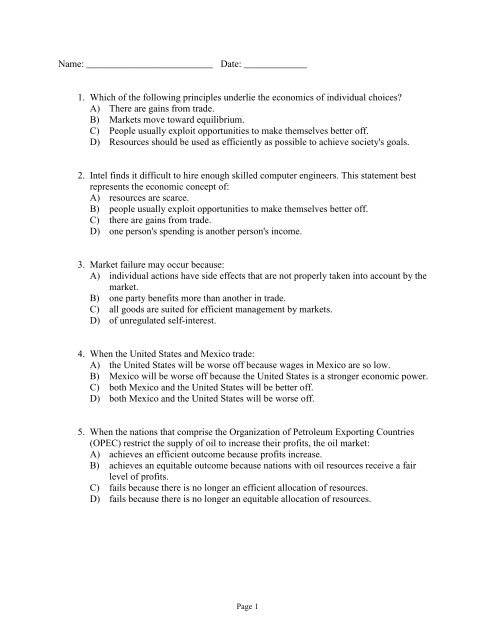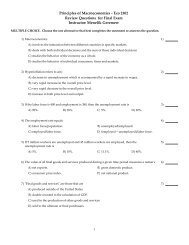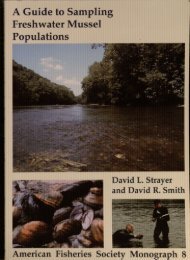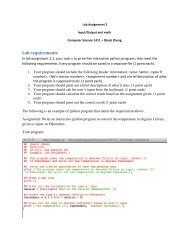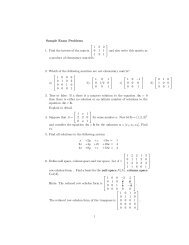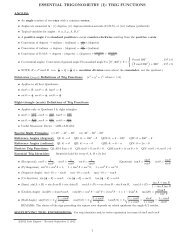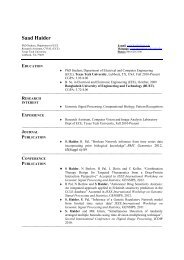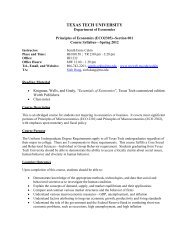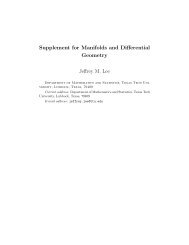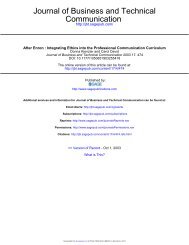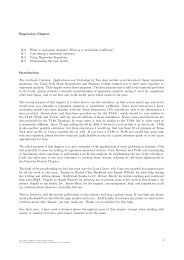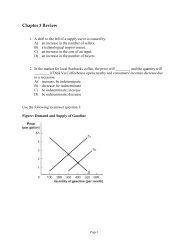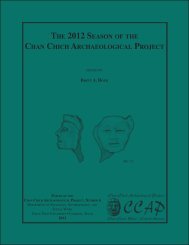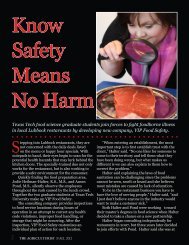Name: Date: ______ 1. Which of the following principles ... - MyWeb
Name: Date: ______ 1. Which of the following principles ... - MyWeb
Name: Date: ______ 1. Which of the following principles ... - MyWeb
You also want an ePaper? Increase the reach of your titles
YUMPU automatically turns print PDFs into web optimized ePapers that Google loves.
<strong>Name</strong>: __________________________ <strong>Date</strong>: _____________<br />
<strong>1.</strong> <strong>Which</strong> <strong>of</strong> <strong>the</strong> <strong>following</strong> <strong>principles</strong> underlie <strong>the</strong> economics <strong>of</strong> individual choices?<br />
A) There are gains from trade.<br />
B) Markets move toward equilibrium.<br />
C) People usually exploit opportunities to make <strong>the</strong>mselves better <strong>of</strong>f.<br />
D) Resources should be used as efficiently as possible to achieve society's goals.<br />
2. Intel finds it difficult to hire enough skilled computer engineers. This statement best<br />
represents <strong>the</strong> economic concept <strong>of</strong>:<br />
A) resources are scarce.<br />
B) people usually exploit opportunities to make <strong>the</strong>mselves better <strong>of</strong>f.<br />
C) <strong>the</strong>re are gains from trade.<br />
D) one person's spending is ano<strong>the</strong>r person's income.<br />
3. Market failure may occur because:<br />
A) individual actions have side effects that are not properly taken into account by <strong>the</strong><br />
market.<br />
B) one party benefits more than ano<strong>the</strong>r in trade.<br />
C) all goods are suited for efficient management by markets.<br />
D) <strong>of</strong> unregulated self-interest.<br />
4. When <strong>the</strong> United States and Mexico trade:<br />
A) <strong>the</strong> United States will be worse <strong>of</strong>f because wages in Mexico are so low.<br />
B) Mexico will be worse <strong>of</strong>f because <strong>the</strong> United States is a stronger economic power.<br />
C) both Mexico and <strong>the</strong> United States will be better <strong>of</strong>f.<br />
D) both Mexico and <strong>the</strong> United States will be worse <strong>of</strong>f.<br />
5. When <strong>the</strong> nations that comprise <strong>the</strong> Organization <strong>of</strong> Petroleum Exporting Countries<br />
(OPEC) restrict <strong>the</strong> supply <strong>of</strong> oil to increase <strong>the</strong>ir pr<strong>of</strong>its, <strong>the</strong> oil market:<br />
A) achieves an efficient outcome because pr<strong>of</strong>its increase.<br />
B) achieves an equitable outcome because nations with oil resources receive a fair<br />
level <strong>of</strong> pr<strong>of</strong>its.<br />
C) fails because <strong>the</strong>re is no longer an efficient allocation <strong>of</strong> resources.<br />
D) fails because <strong>the</strong>re is no longer an equitable allocation <strong>of</strong> resources.<br />
Page 1
6. The cost <strong>of</strong> leaving <strong>the</strong> skating championship before <strong>the</strong> possibility <strong>of</strong> seeing a perfect<br />
“10” performance is ________, while <strong>the</strong> cost <strong>of</strong> staying for <strong>the</strong> entire program is<br />
___________:<br />
A) <strong>the</strong> opportunity cost <strong>of</strong> not seeing a possible perfect “10” performance; zero—<strong>the</strong><br />
ticket to <strong>the</strong> championship is already paid, so <strong>the</strong>re is no cost<br />
B) <strong>the</strong> opportunity cost <strong>of</strong> not seeing a possible perfect “10” performance; <strong>the</strong><br />
opportunity cost <strong>of</strong> what else you could have done during that time<br />
C) zero—you don't have to pay to leave; zero—<strong>the</strong> ticket to <strong>the</strong> match is already paid,<br />
so <strong>the</strong>re is no cost<br />
D) <strong>the</strong> cost <strong>of</strong> <strong>the</strong> ticket; also <strong>the</strong> cost <strong>of</strong> <strong>the</strong> ticket<br />
7. The problem <strong>of</strong> determining what goods and services society should produce:<br />
A) exists because we can produce more than we need or want.<br />
B) exists because <strong>the</strong>re are not enough resources to provide all <strong>the</strong> goods and services<br />
that people want to purchase.<br />
C) would not exist if all goods and services were scarce.<br />
D) would not exist if government owned all <strong>of</strong> <strong>the</strong> resources.<br />
8. Florida schools <strong>of</strong>fered cash bonuses to students who scored high on <strong>the</strong> state's<br />
standardized exams. The cash bonuses are an example <strong>of</strong> which <strong>of</strong> <strong>the</strong> <strong>following</strong> basic<br />
economic <strong>principles</strong>?<br />
A) Resources are scarce.<br />
B) The real cost <strong>of</strong> something is what you must give up to get it.<br />
C) There are gains from trade.<br />
D) People usually take advantage <strong>of</strong> opportunities to make <strong>the</strong>mselves better <strong>of</strong>f.<br />
9. Scarcity in economics means:<br />
A) not having sufficient resources to produce all <strong>the</strong> goods and services we want.<br />
B) <strong>the</strong> wants <strong>of</strong> people are limited.<br />
C) <strong>the</strong>re must be poor people in rich countries.<br />
D) shortages exist in nearly all markets.<br />
10. Equity means that:<br />
A) everyone gets an equal share <strong>of</strong> <strong>the</strong> goods and services produced.<br />
B) everyone gets a fair share <strong>of</strong> <strong>the</strong> goods and services produced.<br />
C) more <strong>of</strong> some goods and services can be produced only if <strong>the</strong> production <strong>of</strong> o<strong>the</strong>rs<br />
is reduced.<br />
D) more <strong>of</strong> all goods and services may be produced.<br />
Page 2
1<strong>1.</strong> The principle <strong>of</strong> making decisions at <strong>the</strong> margin refers to:<br />
A) making incremental choices.<br />
B) all or none <strong>of</strong> something.<br />
C) engaging in unethical activities.<br />
D) making difficult choices.<br />
12. The opportunity cost <strong>of</strong> something is:<br />
A) greater during periods <strong>of</strong> rising prices.<br />
B) equal to <strong>the</strong> money cost.<br />
C) less during periods <strong>of</strong> falling prices.<br />
D) what is given up to acquire it.<br />
13. <strong>Which</strong> <strong>of</strong> <strong>the</strong> <strong>following</strong> methods <strong>of</strong> discouraging speeding is likely to be most effective?<br />
A) increasing <strong>the</strong> number <strong>of</strong> signs stating <strong>the</strong> speed limit<br />
B) increasing <strong>the</strong> fine associated with speeding tickets<br />
C) public service announcements reminding drivers <strong>of</strong> <strong>the</strong> dangers <strong>of</strong> speeding<br />
D) installing speed bumps<br />
14. <strong>Which</strong> <strong>of</strong> <strong>the</strong> <strong>following</strong> statements is correct?<br />
A) Resource scarcity is not a major economic concern in <strong>the</strong> rich countries <strong>of</strong> <strong>the</strong><br />
world.<br />
B) While opportunity costs usually exist, some opportunity costs are zero.<br />
C) An economic situation is in equilibrium when no individual would be better <strong>of</strong>f<br />
taking a different action.<br />
D) Some very talented, skilled individuals who can do everything better than most<br />
people should not specialize in doing any one thing.<br />
15. I know when I shop at <strong>the</strong> local grocery store, I am helping my community. This<br />
statement best represents <strong>the</strong> economic concept <strong>of</strong>:<br />
A) people usually exploit opportunities to make <strong>the</strong>mselves better <strong>of</strong>f.<br />
B) <strong>the</strong>re are gains from trade.<br />
C) one person's spending is ano<strong>the</strong>r person's income.<br />
D) overall spending sometimes gets out <strong>of</strong> line with <strong>the</strong> economy's productive<br />
capacity.<br />
Page 3
16. Margo spends $10,000 on one year's college tuition and will leave her job to be a<br />
full-time student. The opportunity cost <strong>of</strong> spending one year in college for Margo is:<br />
A) $10,000.<br />
B) whatever she would have purchased with <strong>the</strong> $10,000 instead.<br />
C) whatever she would have earned had she not been in college.<br />
D) whatever she would have purchased with <strong>the</strong> $10,000 and whatever she would<br />
have earned had she not been in college.<br />
17. <strong>Which</strong> <strong>of</strong> <strong>the</strong> <strong>following</strong> would be a part <strong>of</strong> macroeconomics?<br />
A) a study <strong>of</strong> <strong>the</strong> change in automobile sales due to a change in <strong>the</strong> price <strong>of</strong><br />
automobiles<br />
B) a study <strong>of</strong> <strong>the</strong> impact <strong>of</strong> a tax reduction on <strong>the</strong> pr<strong>of</strong>its <strong>of</strong> a business<br />
C) a study <strong>of</strong> <strong>the</strong> decline in <strong>the</strong> housing industry due to high interest rates<br />
D) a study <strong>of</strong> <strong>the</strong> unemployment <strong>of</strong> workers displaced by technological change in <strong>the</strong><br />
typesetting industry<br />
18. <strong>Which</strong> <strong>of</strong> <strong>the</strong>se is one <strong>of</strong> <strong>the</strong> four <strong>principles</strong> <strong>of</strong> individual choice?<br />
A) Resources are usually renewable.<br />
B) The real cost <strong>of</strong> something is impossible to measure.<br />
C) People take advantage <strong>of</strong> opportunities to make <strong>the</strong>mselves better <strong>of</strong>f only if <strong>the</strong>re<br />
is no risk involved.<br />
D) Resources are scarce.<br />
19. The “invisible hand” concept refers to:<br />
A) bits and pieces <strong>of</strong> <strong>the</strong> economy.<br />
B) <strong>the</strong> question <strong>of</strong> how a business unit should operate pr<strong>of</strong>itably.<br />
C) how individuals who pursue <strong>the</strong>ir self-interest can end up bettering society.<br />
D) how individuals make decisions.<br />
20. A busy pr<strong>of</strong>essor can't decide whe<strong>the</strong>r or not to stay in her <strong>of</strong>fice to grade papers for<br />
ano<strong>the</strong>r hour or to go home and go to bed. This is an example <strong>of</strong>:<br />
A) equity versus efficiency.<br />
B) how one person's spending is ano<strong>the</strong>r person's income.<br />
C) economic incentives.<br />
D) marginal analysis.<br />
Page 4
2<strong>1.</strong> A key <strong>the</strong>me fundamental in <strong>the</strong> study <strong>of</strong> economics is:<br />
A) <strong>the</strong>re are limited wants.<br />
B) we are a rich country but are simply not aware <strong>of</strong> it.<br />
C) people have unlimited wants but face limited means <strong>of</strong> satisfying <strong>the</strong>m.<br />
D) <strong>the</strong>re are unlimited resources.<br />
22. You decide to join <strong>the</strong> economics club, but this means you can't join <strong>the</strong> accounting club<br />
because it meets at <strong>the</strong> same time. This statement best represents <strong>the</strong> economic concept<br />
<strong>of</strong>:<br />
A) <strong>the</strong> real cost <strong>of</strong> something is what you must give up to get it.<br />
B) “how much?” is a decision at <strong>the</strong> margin.<br />
C) people usually exploit opportunities to make <strong>the</strong>mselves better <strong>of</strong>f.<br />
D) <strong>the</strong>re are gains from trade.<br />
23. You like to read People and Sports Illustrated. You only have $5 to spend, so you only<br />
buy Sports Illustrated. This statement best represents <strong>the</strong> economic concept <strong>of</strong>:<br />
A) resources are scarce.<br />
B) <strong>the</strong> real cost <strong>of</strong> something is what you must give up to get it.<br />
C) “how much?” is a decision at <strong>the</strong> margin.<br />
D) <strong>the</strong>re are gains from trade.<br />
24. <strong>Which</strong> <strong>of</strong> <strong>the</strong> <strong>following</strong> best describes all <strong>the</strong> resources used in <strong>the</strong> production <strong>of</strong><br />
computers?<br />
A) computer engineers<br />
B) microchip manufacturing facility<br />
C) computer engineers, computers, and microchip manufacturing facility<br />
D) computers<br />
25. When markets fail:<br />
A) government intervention may help.<br />
B) <strong>the</strong> market realizes <strong>the</strong> maximum possible gains from trade given <strong>the</strong> available<br />
resources.<br />
C) <strong>the</strong>re may still be an efficient allocation <strong>of</strong> resources.<br />
D) no goods and services are produced.<br />
Page 5
26. If <strong>the</strong> market for corn is in equilibrium:<br />
A) every buyer who wants to consume corn can acquire corn.<br />
B) every producer who wants to sell corn can do so.<br />
C) <strong>the</strong> price is at a level where <strong>the</strong> quantity <strong>of</strong> corn produced is equal to <strong>the</strong> quantity <strong>of</strong><br />
corn consumed.<br />
D) all producers <strong>of</strong> corn earn <strong>the</strong> same amount <strong>of</strong> income from <strong>the</strong> sale <strong>of</strong> corn.<br />
27. In an attempt to reduce deaths from shootings, some cities have <strong>of</strong>fered money to people<br />
who turn in illegal guns. This program is an example <strong>of</strong> <strong>the</strong> government using<br />
__________ to influence behavior:<br />
A) incentives<br />
B) law<br />
C) marginal analysis<br />
D) <strong>the</strong> gains from trade<br />
28. <strong>Which</strong> book illustrates <strong>the</strong> advantages <strong>of</strong> specialization using an eighteenth-century pin<br />
factory?<br />
A) Free to Choose by Milton Friedman<br />
B) The Wealth <strong>of</strong> Nations by Adam Smith<br />
C) Das Kapital by Karl Marx<br />
D) The General Theory by John Maynard Keynes<br />
29. <strong>Which</strong> <strong>of</strong> <strong>the</strong> <strong>following</strong> statements is not true?<br />
A) Economic efficiency exists when an economy realizes <strong>the</strong> maximum possible gains<br />
from trade given <strong>the</strong> available resources.<br />
B) If an economy is efficient, <strong>the</strong>n it is possible to make only a few people better <strong>of</strong>f<br />
without reducing o<strong>the</strong>r individuals' economic welfare.<br />
C) Economic efficiency exists when all opportunities to make people better <strong>of</strong>f have<br />
been fully exploited.<br />
D) Markets usually lead to efficiency.<br />
30. In most cases, economic efficiency is achieved through:<br />
A) incentives built into a market economy.<br />
B) regulation <strong>of</strong> <strong>the</strong> invisible hand.<br />
C) individuals seeking out opportunities that involve no risk.<br />
D) maximizing equity.<br />
Page 6
3<strong>1.</strong> If <strong>the</strong> state government allocates additional spending on education, <strong>the</strong> opportunity cost<br />
is:<br />
A) zero.<br />
B) <strong>the</strong> dollar amount <strong>of</strong> <strong>the</strong> additional spending.<br />
C) only considered if additional taxes need to be raised to fund <strong>the</strong> spending.<br />
D) measured in terms <strong>of</strong> <strong>the</strong> alternative uses for that additional spending.<br />
32. Although for smokers <strong>the</strong> marginal benefit from smoking may exceed <strong>the</strong> marginal cost<br />
<strong>of</strong> smoking, <strong>the</strong> negative effects <strong>of</strong> second-hand smoke may increase <strong>the</strong> marginal costs<br />
<strong>of</strong> smoking to society to a point where <strong>the</strong>y exceed that marginal benefit to society. This<br />
is an example <strong>of</strong>:<br />
A) individual actions that have side effects that are not properly taken into account by<br />
<strong>the</strong> market.<br />
B) one party preventing mutually beneficial trades from occurring in an attempt to<br />
capture a greater share <strong>of</strong> resources for itself.<br />
C) some goods' unsuitability for efficient management by markets.<br />
D) unregulated self-interest.<br />
33. It is better to produce corn in Kansas because <strong>of</strong> <strong>the</strong> rainfall ra<strong>the</strong>r than in Death Valley,<br />
California. This statement best represents <strong>the</strong> economic concept <strong>of</strong>:<br />
A) scarcity.<br />
B) markets move toward equilibrium.<br />
C) resources should be used as efficiently as possible to achieve society's goals.<br />
D) human capital.<br />
34. An increase in efficiency means that an economy has:<br />
A) reduced its opportunity costs.<br />
B) increased <strong>the</strong> equity <strong>of</strong> its distribution <strong>of</strong> goods and services.<br />
C) made some people better <strong>of</strong>f without making o<strong>the</strong>rs worse <strong>of</strong>f.<br />
D) increased <strong>the</strong> incentives for its citizens to follow <strong>the</strong>ir own self-interest.<br />
35. <strong>Which</strong> <strong>of</strong> <strong>the</strong> <strong>following</strong> is not one <strong>of</strong> <strong>the</strong> four <strong>principles</strong> <strong>of</strong> individual choice?<br />
A) Resources are scarce.<br />
B) Economic rationality dictates that individuals should only engage in work <strong>the</strong>y are<br />
paid for.<br />
C) The real cost <strong>of</strong> something is its opportunity cost.<br />
D) People usually take advantage <strong>of</strong> opportunities to make <strong>the</strong>mselves better <strong>of</strong>f.<br />
Page 7
36. <strong>Which</strong> <strong>of</strong> <strong>the</strong> <strong>following</strong> is an example <strong>of</strong> marginal analysis?<br />
A) A hungry person orders a pizza ra<strong>the</strong>r than eating leftover meatloaf.<br />
B) A hungry person decides whe<strong>the</strong>r or not to eat one more slice <strong>of</strong> pizza.<br />
C) A hungry person uses a coupon to save $2 on a pizza.<br />
D) A hungry person writes a check to pay for <strong>the</strong> pizza ra<strong>the</strong>r than using his credit<br />
card.<br />
37. Sometimes <strong>the</strong> government spends more or less, depending on <strong>the</strong> needs <strong>of</strong> <strong>the</strong> country.<br />
This statement best represents <strong>the</strong> economic concept <strong>of</strong>:<br />
A) resources should be used as efficiently as possible to achieve society's goals.<br />
B) when markets don't achieve efficiency, government intervention can improve<br />
society's welfare.<br />
C) overall spending sometimes gets out <strong>of</strong> line with <strong>the</strong> economy's productive<br />
capacity.<br />
D) government policies can change spending.<br />
38. Individuals gain from trade because:<br />
A) <strong>of</strong> specialization in production.<br />
B) <strong>the</strong>y can sell at a lower price than <strong>the</strong>y can buy at.<br />
C) self-sufficiency is efficient.<br />
D) <strong>of</strong> <strong>the</strong> principle <strong>of</strong> absolute advantage.<br />
39. <strong>Which</strong> <strong>of</strong> <strong>the</strong> <strong>following</strong> statements is true?<br />
A) The concept <strong>of</strong> equilibrium requires that all individuals have an equal amount <strong>of</strong><br />
income.<br />
B) If equilibrium in a market exists, <strong>the</strong>n <strong>the</strong> price in that market will not fluctuate by<br />
more than 5%.<br />
C) If equilibrium in a market exists, <strong>the</strong>n <strong>the</strong>re will be no remaining opportunities for<br />
individuals to make <strong>the</strong>mselves better <strong>of</strong>f.<br />
D) Equilibrium in a market will exist when <strong>the</strong> number <strong>of</strong> buyers is equal to <strong>the</strong><br />
number <strong>of</strong> sellers.<br />
40. One parent picks up <strong>the</strong> child from day care while <strong>the</strong> o<strong>the</strong>r parent goes to <strong>the</strong> grocery<br />
store and begins to make dinner. This is an example <strong>of</strong> which principle at work?<br />
A) Markets move toward equilibrium.<br />
B) Government policies can change spending.<br />
C) There are gains from trade.<br />
D) Markets usually lead to efficiency.<br />
Page 8
4<strong>1.</strong> <strong>Which</strong> <strong>of</strong> <strong>the</strong> <strong>following</strong> is an example <strong>of</strong> individual choice?<br />
A) The government announces plans to ban smoking in all Florida restaurants.<br />
B) Lauren spends her allowance on pillows for her bed.<br />
C) France decides to withhold funding to rebuild Iraq.<br />
D) Africa decides to accept U.S. aid for humanitarian efforts.<br />
42. Opportunity cost is:<br />
A) about half <strong>of</strong> <strong>the</strong> monetary cost <strong>of</strong> a product.<br />
B) <strong>the</strong> dollar payment for a product.<br />
C) <strong>the</strong> benefit derived from a product.<br />
D) <strong>the</strong> value <strong>of</strong> <strong>the</strong> best alternative forgone in making any choice.<br />
43. A choice made ________ helps us to decide whe<strong>the</strong>r to do a little more or a little less <strong>of</strong><br />
something.<br />
A) at <strong>the</strong> front end<br />
B) in <strong>the</strong> beginning<br />
C) at <strong>the</strong> margin<br />
D) ceteris paribus<br />
44. The best example <strong>of</strong> making a choice at <strong>the</strong> margin is:<br />
A) buying a new computer.<br />
B) quitting your job.<br />
C) eating ano<strong>the</strong>r slice <strong>of</strong> pizza.<br />
D) attending college.<br />
45. How people choose among <strong>the</strong> alternatives available to <strong>the</strong>m is:<br />
A) not part <strong>of</strong> <strong>the</strong> study <strong>of</strong> economics.<br />
B) impossible to describe.<br />
C) <strong>the</strong> study <strong>of</strong> microeconomics.<br />
D) not important.<br />
46. Everyone benefits from street lighting, yet <strong>the</strong> marginal benefit to any one individual<br />
usually falls short <strong>of</strong> <strong>the</strong> marginal cost. This is an example <strong>of</strong>:<br />
A) individual actions that have side effects that are not properly taken into account by<br />
<strong>the</strong> market.<br />
B) one party preventing mutually beneficial trades from occurring in an attempt to<br />
capture a greater share <strong>of</strong> resources for itself.<br />
C) <strong>the</strong> unsuitability <strong>of</strong> some goods for efficient management by markets.<br />
D) unregulated self-interest.<br />
Page 9
47. Market failure occurs when:<br />
A) prices <strong>of</strong> essential goods such as gas become very high.<br />
B) individual actions have side effects that are not properly taken into account.<br />
C) mutually beneficial trades take place.<br />
D) a business declares bankruptcy.<br />
48. <strong>Which</strong> <strong>of</strong> <strong>the</strong> <strong>following</strong> statements is not true?<br />
A) Resource scarcity is a major economic concern in <strong>the</strong> rich countries <strong>of</strong> <strong>the</strong> world.<br />
B) Most opportunity costs are zero.<br />
C) An economic situation is in equilibrium when no individual would be better <strong>of</strong>f<br />
taking a different action.<br />
D) Some very talented, skilled individuals who can do some things better than most<br />
people should specialize in doing that one thing.<br />
49. Owen had a typewriter retail business but he went out <strong>of</strong> business because no one buys<br />
typewriters anymore. This statement best represents <strong>the</strong> economic concept <strong>of</strong>:<br />
A) resources are scarce.<br />
B) people usually exploit opportunities to make <strong>the</strong>mselves better <strong>of</strong>f.<br />
C) diminishing returns.<br />
D) one person's spending is ano<strong>the</strong>r person's income.<br />
50. Water is considered a scarce good because:<br />
A) not enough clean water is available for all <strong>of</strong> society's wants.<br />
B) it does not have any uses.<br />
C) scarce goods are less expensive.<br />
D) <strong>the</strong>re is not enough clean water available to meet all <strong>of</strong> society's wants and it is also<br />
less expensive.<br />
Page 10


